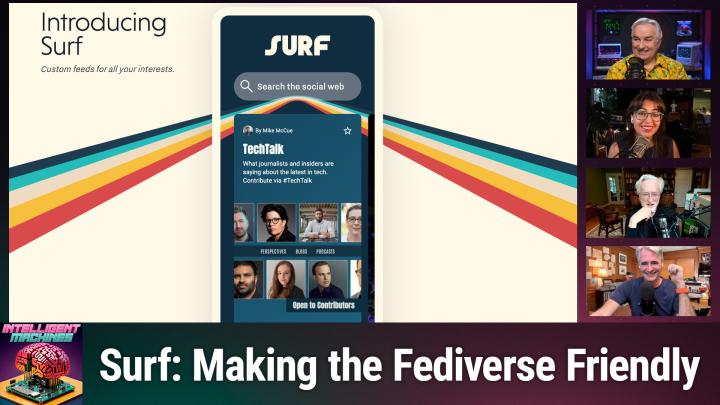How Flipboard’s New Social Browser Is Reimagining the Open Web
This article was generated by AI, and edited by humans.
In the latest episode of Intelligent Machines, Leo Laporte, Jeff Jarvis, and Paris Martineau welcomed a special guest who's no stranger to innovation: Mike McCue, the founder and CEO of Flipboard. McCue joined the show to discuss Flipboard’s newest venture, Surf - a social browser designed to unify and revitalize the open social web.
From Flipboard to Surf: The Evolution of Social Discovery
McCue has spent his career building various types of web browsers, from early 3D browsers using VRML to voice browsers with Tellme (which was acquired by Microsoft). Flipboard, which McCue launched in 2010, revolutionized how people consumed social media and news content by transforming it into a magazine-like experience, particularly optimized for tablets.
Flipboard’s new project, Surf, represents an evolution of these ideas. While Flipboard connected to various social media APIs, Surf takes advantage of today's open protocols like ActivityPub, AT Protocol, and RSS to create a unified social browsing experience.
What Makes Surf Different?
During the demonstration, McCue showed how Surf functions as a browser for the "social web" rather than just websites. The app allows users to:
- Navigate feeds from across different platforms (Mastodon, Bluesky, Threads, Pixelfed, etc.)
- Filter content by type (watch videos, listen to podcasts, view photos)
- Create and curate custom feeds by combining sources from different platforms
- Follow creators regardless of which platform they're posting from
One compelling example McCue shared involved "NBA Threads" - a community that had been fragmented across different platforms. Using Surf, the community could be reunited in a single feed that pulls content from Bluesky, Threads, and Mastodon simultaneously.
The Power of Human Curation in an AI World
The hosts and McCue discussed how Surf addresses a critical need in today's internet landscape: finding quality content amidst growing amounts of AI-generated material. McCue explained that human curation, enhanced by AI tools, offers a valuable solution.
Surf empowers users to create curated feeds about topics they care about and share them with others. This "bionic curator" approach combines human discernment with technological tools. For example, users can take an existing feed and apply AI filters to narrow it down to specific topics, creating a personalized experience that still maintains human judgment at its core.
The Business Model and Publisher Relationships
When discussing monetization, McCue emphasized that Surf aims to support various business models for content creators. Publishers can incorporate ads into their feeds, implement paywalls, or use the platform to drive website traffic.
The hosts noted that Flipboard has historically been a significant traffic driver for publishers, and Surf continues this publisher-friendly approach. Unlike walled gardens that limit monetization options, Surf gives publishers control over how they generate revenue.
A New Vision for the Social Web
Throughout the conversation, McCue articulated a vision for the social web that moves beyond siloed platforms. He parallels the early internet, when AOL's proprietary model gave way to the open web and browsers like Netscape.
McCue believes we're at a similar inflection point today, where open protocols can replace closed social networks. By creating connections between people (not just content) across different platforms, Surf helps build a more intricate and useful web - one where communities can thrive regardless of which specific app members use.
The Future of Surf
Currently in beta testing on Android in the Google Play Store and on iOS through TestFlight, Surf is gradually adding users as the team refines the experience. McCue mentioned plans for desktop applications and a web version. The team is particularly focused on bringing in people interested in building feeds around specific interests, hobbies, or topics.
The hosts expressed enthusiasm about Surf's potential to reshape how we experience social media, with Laporte noting that it offers a compelling alternative to opening individual social apps.
Looking Ahead
McCue's vision for Surf aligns with broader movements toward decentralization and interoperability in social media. By embracing open protocols rather than creating yet another walled garden, Surf represents a different approach to social discovery - one that prioritizes user choice, creator control, and genuine human connection.
Whether Surf will achieve mainstream adoption remains to be seen, but it already offers a refreshing alternative for those frustrated by the limitations of traditional social platforms. As AI-generated content becomes more prevalent, tools that help surface human-created content may become increasingly valuable.
Want to hear the full conversation with Mike McCue and learn more about how Surf is reimagining social browsing? Listen to the complete episode of Intelligent Machines wherever you get your podcasts.
